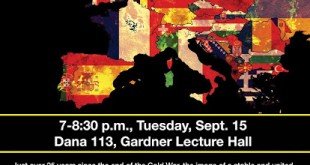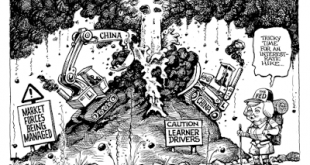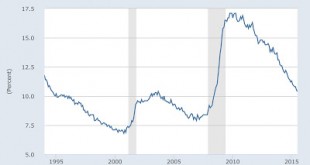If you're around Lewisburg next Tuesday.
Read More »Jayati Ghosh on the Poverty-turn in Development Economics
As much as there has been an institutional turn in mainstream economics, since the 1980s, which is not completely dissociated from the anti-Keynesian turn that started in the 1970s and led to the segregation of heterodox groups within the profession, there has been a poverty-turn in the development economic literature, as noted by Jayati Ghosh.Particularly important in this shift is that:"Macroeconomic processes are entirely ignored: patterns of trade and economic activity that determine...
Read More »More on the Greek Crisis at the Rick Smith Show
Teaching Marx in Lewisburg
I've been teaching an Intermediate Political Economy course, substituting Berhanu Nega, who regularly teaches this course. The text used, and it was already in the bookstore, is Bowles, Edwards and Roosevelt's Understanding Capitalism, which puts an emphasis on individual behavior as the main difference with the marginalist view, and is not the best choice, in my view. At any rate here are a few old posts on Marx, which is central to the first part of the course (towards the end Veblen...
Read More »Will the Fed hike the interest rate?
It seems increasingly probable. Stanley Fischer suggested that is possible in his speech last weekend at Jackson Hole. My bet is that unless labor markets numbers are terrible Friday, there is a good chance there will be a minor rate increase in the next meeting. That is a bit of a surprise. It's also not a very good idea, as I noted before, and Mark Weisbrot suggests here.
Read More »Thirlwall à la Godley
Short note on Thirlwall's Law by Lance Taylor available here. As he notes on Thirlwall's Law: "Insofar as they [the conditions to generate it] are 'extreme,' the plausibility of (3) [Thirlwall's Law] is open to doubt," which is one of the points I raised in my recent debate with Jaime Ros. Causality here remains from exports to growth, which was reversed in Clavijo and Ros, but there is a healthy skepticism about the generality of the law.Arguably Godley had a version of Thirlwall's Law...
Read More »Martin Feldstein on Wall Street Instability and Interest Rate Policy
Martin Feldstein, chairman of the Council of Economic Advisers (CEA) during the Reagan administration, and one of the most influential economists in policy circles says that: "Market participants know that the economy is now essentially at full employment, that the consumer-price index is close to 2% and that there is little risk of deflation."Few things. This:Broader measure of unemployment is at 10.4%. Then this:That is, the increase in employment, for the growing population, since the...
Read More »Thirlwall’s Law debate in Investigación Económica
The other side Jaime Ros, with Pedro Hugo Clavijo, wrote a critique of Thirlwall's Law (in Spanish). Replies by Carlos Ibarra here, Esteban Pérez here and myself here. Their rejoinder here. All in Spanish. Haven't read the whole rejoinder yet (just got it), but for some reason they insist that the supermultiplier implies that exports are always the main source of autonomous demand.* Hm, that's weird. Just puzzled by that one. They should read Bortis and Serrano (this one with Fabio...
Read More »Did anyone notice the global financial crisis of 2007–2008?
By Paul DavidsonOn November 4, 2008, at the dedication of a new building, Queen Elizabeth of Great Britain visited the London School of Economics (LSE). While there she was given a briefing by academics at the LSE on the origins and effects of the global financial crisis and its resulting turmoil in international financial markets. The Queen is reported to have asked, “Why did nobody notice it developing?” The director of research at LSE told her, “At every stage someone was relying on...
Read More »Obituaries: Nathan Rosenberg (1927-2015)
E-mail was sent to the Society for the History of Economics (SHOE) informing that Nathan Rosenberg has passed away. Have not seen an obituary, but will link later. He was the author How the West Grew Rich, that suggested that freedom was central for creating the supply-side conditions for economic growth in Western Europe. Several heterodox neo-Schumpeterians used his work, in particular Inside the Black Box. Personally I prefer demand-driven stories, including for technology. At any...
Read More » Naked Keynesianism
Naked Keynesianism





